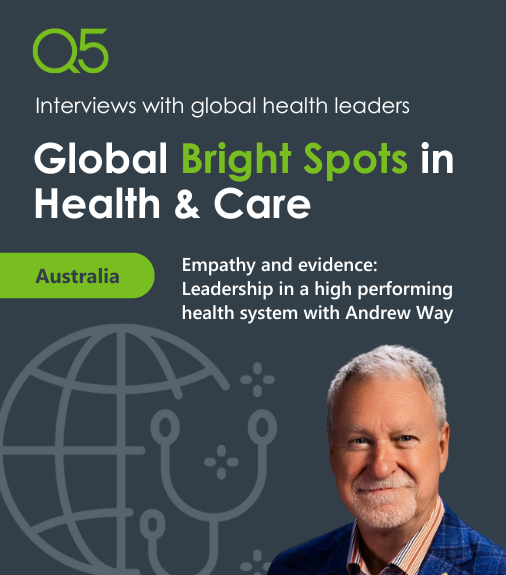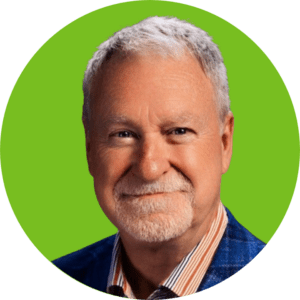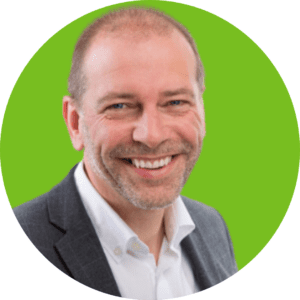

Andrew Way
Andrew has served as Alfred Health’s Chief Executive Officer since 2009. Alfred Health is a major public hospital system in the centre of Melbourne. It employs 11,500 staff, turning over AUD $2 billion. Their services are predominantly complex and challenging, such as transplants and trauma, and they serve a local community, including local elective, emergency work and mental health.
During his 15 years as CEO, Andrew’s focus has been on improving access, ensuring high quality, safe services with low mortality, within a strong financial framework and a research-supportive environment. Alfred Health is a leader in these areas, known for its research and partnership with Monash University.
Andrew led the development of Victoria’s first Academic Health Science Centre – Monash Partners, now an accredited NHMRC Advanced Health and Research Translation Centre. Prior to his relocation to Melbourne in 2009, Andrew had an extensive career in the NHS in the UK, latterly as CEO of the Royal Free Hampstead NHS Trust.
Reading time: Approx. 10 minutes
If you would like to listen to the podcast version of this interview, you can do so below or via Spotify and Amazon Music.
I had a place at Oxford to do Medicine, and just before my A-Levels, my father died. Instead of getting the two A’s and two B’s that I was predicted, I got two D’s, an E, and an F. My ambition to become a doctor disappeared with the effort of having to re-sit A Levels and do seventh term for Oxbridge. I worked in a toy shop, but my mother said “You will go and get yourself a job, and if you don’t do anything else you can go and do what I did”. She was a nurse, so that is what I did. I remember walking down the stairs in the School of Nursing at the Bristol Royal Infirmary on my first day, into a large coffee area with eighty 18-21-year-old women in it. I was the only man, and the room went silent. It was absolutely daunting. That was my very first day in health.
I moved around and became heavily involved in the Royal College of Nursing. I was one of the movers in removing from the Royal College of Nursing’s Constitution the inability to take industrial action. I led the campaign to allow nurses to take industrial action from the Royal College of Nursing, which wasn’t used until very recently. I became friendly with Tony Wedgwood Benn, who was the MP at the time. I had this slightly odd position at work which was linking to politicians and to very senior officials in health and saw health from quite a different perspective from being a staff nurse on a ward. That really got me interested in how the health system works. Mostly, I saw that it worked for the people who worked in it and not for the people who were receiving care. Over time, I think that became more and more of an issue for me, how difficult it was for people to get the care that they needed, even from the very narrow view I had of it. My journey in health began with that insight; that health was really good at organising itself for the advantage of its people, but not necessarily for the advantage of its patients.
My style as a leader has changed over time and where I have worked. It created in me the ability to be flexible in style and content, to be fit for purpose in different settings. Giving a militant student speech at the Royal College’s representative body is quite different to having a conversation with the nursing officer about why haven’t we got enough students on this ward or why the students aren’t getting enough supervision on this clinical placement. Learning how to do that over time became a real skill. Now the first thing I do in a challenging situation is try to see what the problem looks like from the other side. One of my leadership styles is to ask “what is it the other person sees in the situation, and why do they see it that way?” as a way of trying to understand what an answer or a compromise might look like.
Beyond that, I started to learn the value of evidence as opposed to opinion or prejudice. Most of us have a lot of both. Evidence can be in a range of different forms, from serial anecdotes through to gold-class, gold-plated researched evidence. It doesn’t have to be deeply researched evidence but it must have something that people will understand. I like the notion of an ethical framework that has evidence behind it. Trying to get a position that is grounded in a reality, or grounded in a paradigm that people can interpret in their own mind, is part of my leadership style. I would say that comes from the different places I’ve worked and the different styles of leadership I’ve seen.
As you were talking, I remembered a woman called Doctor Deborah Hennessy, who was Chief Nursing Officer at Saint George’s, who recruited me. I would come into an early shift at 7:00 o’clock in the morning, and there’d be a bunch of roses that she had just picked from her garden on my desk. That little hidden gift just sparked that there’s something about how we care and how we appreciate each other’s worth. Deborah sticks in my mind as somebody who was incredibly strong in the evidence and objective space but was equally strong in the people space. That’s something that I’ve always strived to do because I’m much stronger in the objective space than the people space. I use her as a memory to jog myself back into “So what is the people position here?” because if nothing else, health is about people. The people that provide it, but the people that receive it as well.
All the time really. The most controversial one is the 4-hour Emergency Department target, which many view as an unfounded, administrative burden. If you look at the evidence, it’s actually a research-based, clinical tool that shows if you take longer than this time to get a patient assessed, their outcome of care will be compromised long-term. So when I’ve worked on this one in a number of different settings, both in the UK and here in Australia, I’ve gone back to the roots of the evidence that said it is an administrative rule based on a clinical need that has been identified clinically as necessary. So, let’s start talking about the patient’s experience, getting the patient’s diagnosis, getting them into a pathway of care in a timely way, and on their journey to discharge.
In my colleagues, yes. Some of them get it straight away, and then the more cynical will look at it and go, “You’ve just given me a whole load of flannel”. When I get a response like that back it’s interesting. Some people I would say “you know what, you don’t have to be on this journey you’ll eventually join the gang and we’ll worry about you when you start to join us”. There’s other people who actually want to join the gang, but they don’t want to be discriminated by their colleagues for having joined the gang. You then think about how you respond to their cynicism. Not everyone has to move at the same pace at the same time. Recognising that you’re going to leave some people behind, at least for a time, but you need to appreciate what they’re doing while they’re doing it. Something that I’ve learnt along the journey is that, just because they don’t come today, doesn’t mean they won’t come tomorrow. You have to be prepared for that separation in a cohort.
I have spent most of my career devolving decision making into the clinical arenas nearest the patient. It’s not been perfect by any means, but that’s been the ambition. What the settings in COVID did was reverse that completely, and so we went into total command and control, “If you want to do anything, you ask” and it was really simple. Everything was done very quickly, so if you asked the question, you got the answer. Occasionally I’m sure it wasn’t the perfect answer and certain times it wouldn’t have even been the right answer, but you got an answer and you moved on. That’s why it worked for us, because we didn’t unreasonably ponder the questions, we gave a response. We had lots of groups that we could convene at the drop of a hat and say, “This has happened, we’re not sure, there’s no precedent, what do we do?”, and some great people put their brains to it and said, “This is what we should do, and we’ll review it in two days’ time to see what it’s done”. It was never, “Let’s do this and forget”, it was, “Let’s do this and review”.
There’s a really interesting conversation, again going back to Deborah Hennessey, where I learnt a lot of basic human skills. I can remember taking on a couple of senior medical staff and them getting under my skin and me losing it, and as a consequence, I lost the plan and lost the plot. I know that I don’t suffer fools which is why a place like this for me is a joy because there are no fools here, they’re very, very clever and very, very quick, so people can work at the pace I’m used to. But if they’re not, I know that I struggle with that. Deborah took me aside and helped me find tools to break that tension before saying something stupid. Even today, when I’m in a dialogue with a member of staff who wants to tell me how to do something very differently to the way in which it’s going to be done, I take 24 hours before I reply. I’ve learned now to just stand back and not let my quick wit get in the way of an informed and helpful conversation.
We’ve been recruiting quite a few leaders recently and we’ve got this question about engagement versus process. I’m looking for people who can engage widely and manage the process at the same time, as opposed to sit in their office and manage a process and dictate what has to happen. You have to follow process and be able to demonstrate the process for good governance and other appropriate reasons, but if you don’t do the engagement piece, you don’t win the hearts and minds and you can’t then embed the consequence.
First and foremost, I’d want them to think that we had really changed the way in which we delivered care and services to patients, and that we have improved the quality, safety and reliability of what we do. There’s something about how we engage consumers (patients) in coming to decisions about what we do and the way we do it. Then it’s about actually embedding the inquiry into formalised research programmes with the university.
I don’t read nearly as widely in the sort of classic sense as many of my peers and colleagues. I’ve got a few texts that I refer to from both recent and distant past, but most of my reading is online about what’s coming up and what’s in the news that I need to have a bit more of an understanding about. I was a complete Radio 4 addict, and the equivalent here (Australia) is Radio National, and I must listen to it for several hours a day. It’s a great way of taking in wide ranges of stuff, be it gaming, or artificial intelligence, or the topic of the day in a way that I can grasp and have a conversation about. There isn’t a stack of non-fiction on my bed to tell me how to do the job or what the world looks like. I read to escape, not to learn.
One thing that I do that people are surprised about, is that I always look for the downside. If we’re ever embarking on something, one of the first things I do is ask, “What can go wrong? How will I manage when it goes wrong? Who do I need to cover off so that when it goes wrong, I’ve got some air cover, if it’s that serious?”. An example in the clinical space is that we treated one of the American Airforce men who had blown up in a helicopter in the northern territory and was shipped down to us. What isn’t widely known is that we had done a treatment that had never been done in the world before to get him where he is. Somebody had to find a way of getting it through the bureaucratic machinery in the state, and that was my job. What we were able to do is to reassure ourselves that we had the evidence, and we were acting in the best interests of the patient and their family. Those sorts of moments completely inspire you. We created something that no one else has done, but it took three different countries to come together to be able to work out how to do it. It’s that sort of inspiration that keeps you going.
In historic terms, the Dean of the Royal Post Graduate Medical School, called Professor Sir Colin Dollery, was one of the people that really set me on this road of inquiry, in that he wouldn’t take anything that I said on face value, I had to be able to substantiate it to a degree. He did it in a way that was coaching rather than critical. That skill in a very senior academic (he was one of the top echelons of the UK medical establishment at the time), I just revelled in. I’ve been really lucky in my career to have had a huge number of very senior medics who have influenced me. The University Hospital Association in the UK aligns itself with the UK Association of Deans, and they have a joint meeting every other year. I went to two or three of those while I was a CEO and I knew maybe 3 or 4 CEOs, and I knew almost every Dean in the room. That didn’t strike me until everybody said, “How do you know all these people?”, and almost all of them had been clinical directors or senior researchers at the Hammersmith. So I’ve been very lucky in having people of influence to learn from.
What’s the best advice you’ve been given?
Engage brain before opening mouth. Probably the most frequently not taken…
What advice would you give a younger version of yourself?
Think widely, think worldly, think wisely.
What are you most proud of?
What has been created at the Alfred.

Global Head of Health

Senior Health Advisor
